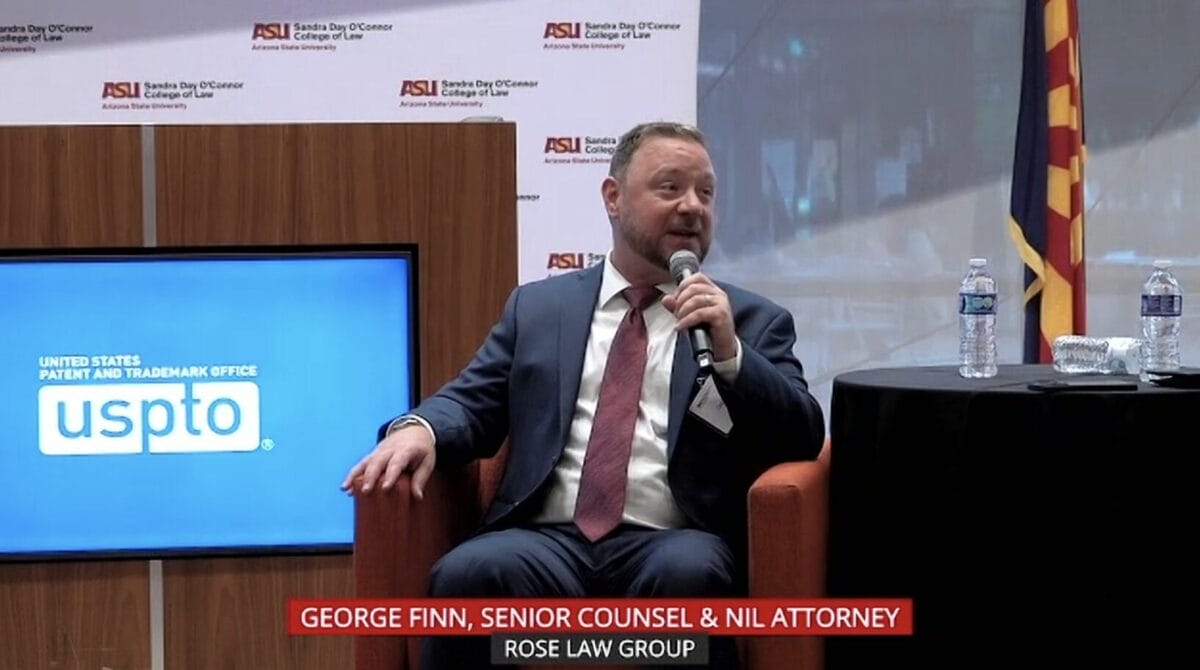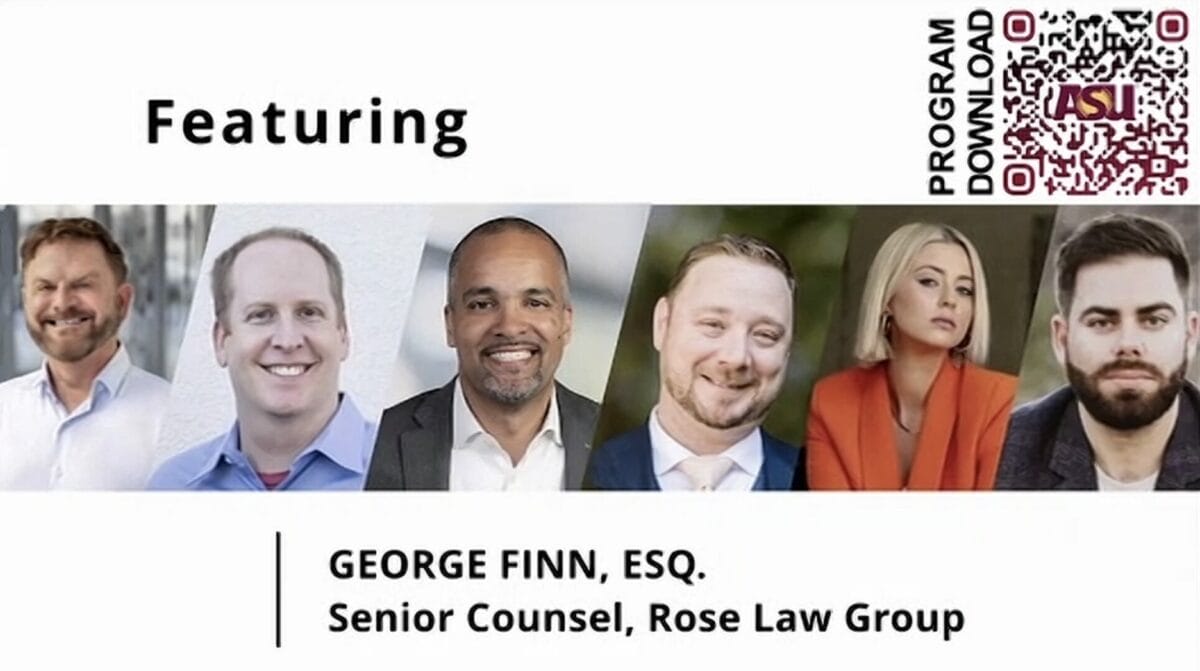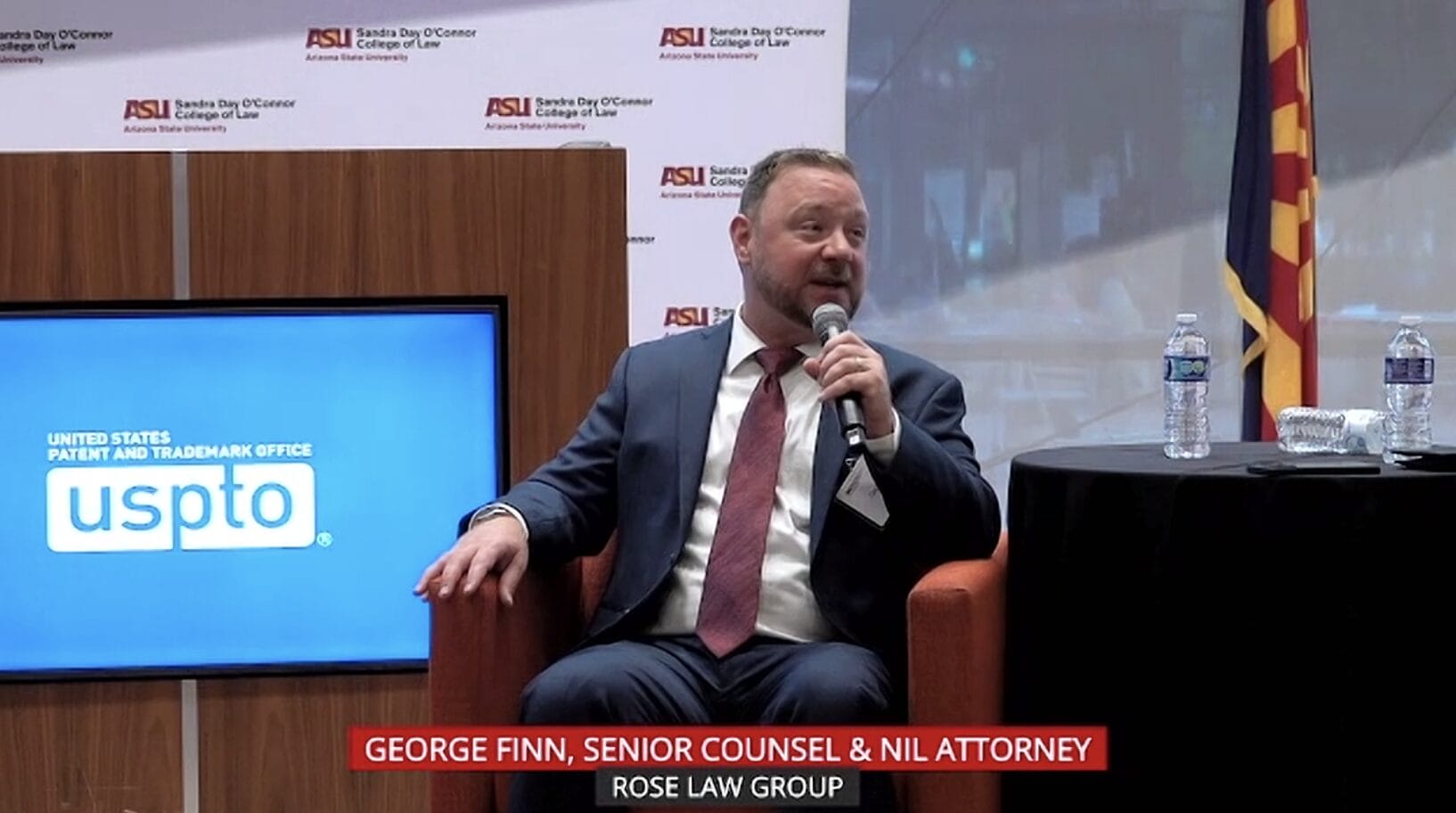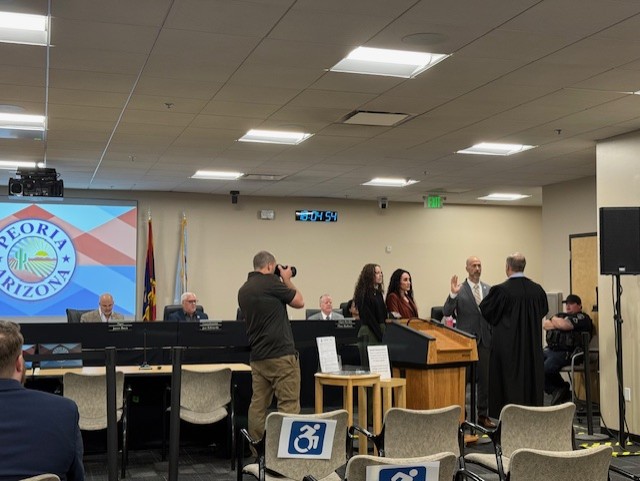By Madelaine Braggs | Rose Law Group Reporter
At a recent panel hosted by the USPTO at Arizona State University’s Sandra Day O’Connor College of Law, legal professionals gathered to discuss the increasingly complex landscape of Name, Image, and Likeness (NIL) rights for student athletes. Moderated by ASU second-year law student Keyerra Harfield, the panel featured: George Finn, Senior Transactions Attorney at Rose Law Group; Luke Fedlam, Managing Partner of Advance NIL; and John Van Dyke, VP of Athlete Marketing at Society LLC.
Throughout the discussion, Finn reflected on his experience handling NIL deals for student athletes, corporate transactions and estate planning to deliver hard-hitting insights about the importance of legal protection for athletes and influencers entering into NIL agreements with brands and collectives.
“Understand Every Sentence”: The Need for Counsel in NIL Deals
George Finn made it clear from the start: “Don’t just sign it. Make sure you understand every sentence that’s in the agreement, each sentence has significant legal consequences,” he said. Finn says in this industry, bargaining power often lies with the corporate entity, regardless of the deal size. He repeatedly stressed the importance of having “adequate counsel” before committing to any contract, reminding us that every business is going to prepare a contract that heavily benefits them, even if it’s not in the best interest of the other party, which is true for any contract, not just athletes
“It’s not only the big deals—it’s the smaller deals too. Regardless, the leverage and the bargaining power are always going to be on the corporate entity,” Finn warned. Without a lawyer in their corner, athletes could find themselves in a vulnerable position, particularly when facing multi-layered contracts with hidden implications. “I’m always anticipating a draft to go back and forth with changes,” Finn added, encouraging athletes to see contracts as a starting point for negotiation rather than something set in stone, and review every line with each draft throughout the process.
Exclusive Contracts and Morality Clauses: Common Pitfalls
When discussing contract provisions, Finn highlighted two critical areas student athletes should be aware of: exclusivity clauses and morality clauses. Exclusivity clauses, which may prevent athletes from working with other brands, can be particularly limiting. “Exclusivity is a big one,” Finn said. “And if you’re in negotiations and there’s no wiggle room, you try to limit that down to a non-compete clause that’s specific to that industry.”
Morality clauses also pose significant risks. “They always keep morality clauses really vague,” Finn remarked, explaining that a vaguely defined morality clause could easily become a point of contention. “I always ask to define what constitutes conduct detrimental to the sponsor.” Finn’s approach is to make sure these clauses are clearly spelled out so athletes know exactly what behavior might breach the contract.
He also introduced the idea of a “reverse morals clause,” something many athletes may not even consider. “You can set terms for them too, especially if it’s a smaller business. If the founder says something that contradicts your values, you can act on that as well,” Finn said, showing that athletes can protect themselves against unethical behavior by the companies they work with.












NIL Collectives: Proceed with Caution
Finn and the panelists also addressed the growing role of NIL collectives, organizations often funded by alumni or donors that pool resources to help student athletes with NIL deals.
“Those contracts in the last three years have become more sophisticated,” noted Luke Fedlam. Some early NIL collective deals, he pointed out, were “garbage,” with terms that were exploitative to student athletes. Finn agreed, adding that athletes should be particularly aware of “breakup fees” written into collective agreements. “If you terminate the contract, you’ll owe X number of dollars,” Finn explained, cautioning athletes to make sure they aren’t bound by unreasonable terms that could hurt them financially if they choose to separate.
The Importance of Termination Clauses
One of the most critical aspects of NIL contracts, according to Finn, is the inclusion of clear and protective termination rights. “Make sure there are termination rights if the sponsorship will tarnish the athlete’s reputation,” Finn emphasized. Finn warned that without these clauses, student athletes could find themselves locked into long-term agreements with little flexibility.
Protecting IP Rights
“With intellectual property rights, you want to make sure you retain your intellectual property rights. Never assign or transfer the ownership of your NIL. Instead, grant a license for the sponsor to use your NIL and limit the duration and scope.
John Van Dyke, said the same due diligence applies in the context of product promotions. “How many golfers have gone out to test and promote a set of clubs and the product’s not good? That’s why it’s important to test the product first. Don’t just sign a deal without having a sample for a couple of weeks,” he advised. Termination clauses can help athletes escape deals where the product doesn’t meet expectations or damages their credibility.
Retroactive NIL Rights and New Legal Challenges
The panel also addressed an emerging issue: the retroactive use of athletes’ NIL rights by universities and sponsors. Finn noted that many former student athletes are starting to pursue legal action, seeking compensation for the use of their likeness in promotional materials long after their playing days ended.
“You’re talking 100-thousands of athletes going however far back. How are they going to be compensated by these institutions?” Finn asked, pointing to potential lawsuits as athletes claim ownership over their NIL rights. “We’ll see more lawsuits about that,” he predicted, “with well-known athletes who say, ‘Just because I left school in 2014 or 1987, I think I brought value and still bring value.’”
The Takeaway: Protecting Yourself Legally
Ultimately, Finn’s message to student athletes and influencers was clear: “You always have to look out for yourself,” he advised. Student athletes need to thoroughly understand every contract they enter into—whether it’s with an agent, a brand, or a collective—and should always consult qualified legal counsel. “Don’t trust ChatGPT,” Finn quipped, underlining the necessity of human expertise when it comes to navigating the complexities of NIL law. “Don’t just trust a buddy, or family member, or random guys a few doors down either.”
For those entering the world of NIL deals, Finn’s parting advice is essential: “Make sure your rights are protected and you’re able to navigate this new type of business relationship.”








